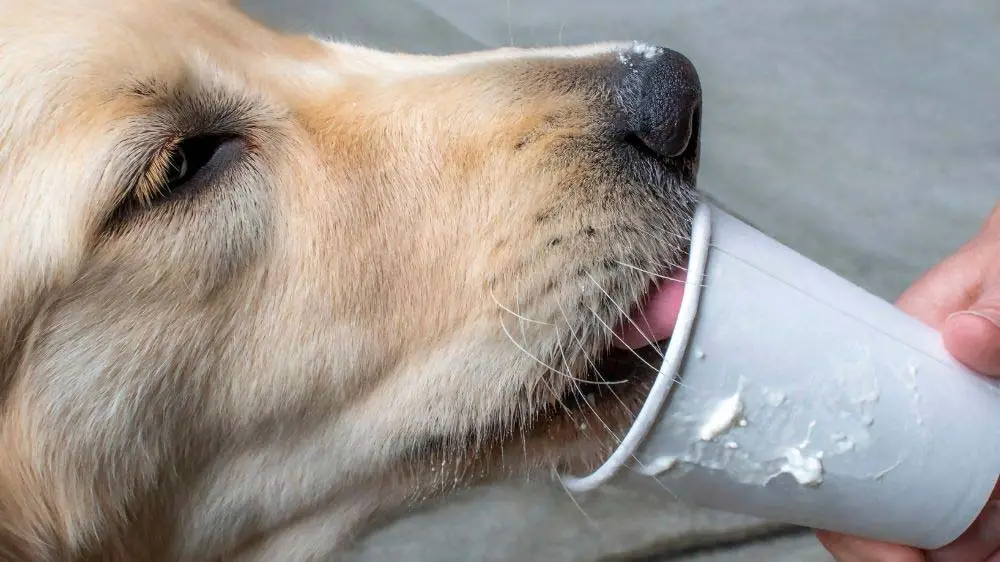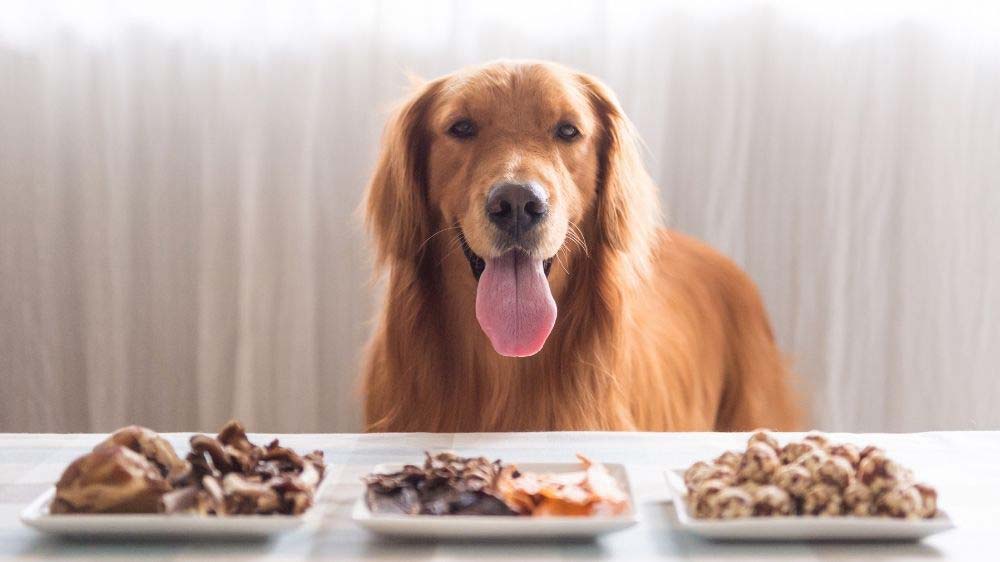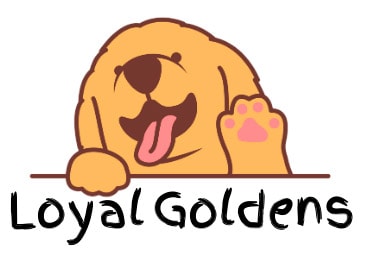Golden retrievers are not typically finicky eaters. In fact, they pretty much gobble up anything you put in front of them! There are some things, however, that you know you shouldn’t give your Golden because they are toxic, like chocolate, grapes, and onions, but what about milk? Can you give milk to a Golden retriever?
While not toxic, you should not give milk to a Golden retriever because many Goldens are lactose intolerant. Lactose intolerant dogs can suffer from a range of digestive issues, such as bloating and vomiting, when ingesting milk and other dairy products.
This article will explain why milk isn’t recommended for Golden retrievers, what milk can do to your dog’s digestive health, and some safer snacks you can give your Golden retrievers instead.

(This article may contain affiliate links and loyalgoldens may earn a commission if a purchase is made.)
Unlock your goldens natural intelligence and see just how quickly problem behaviors disappear.This is the best at home dog training I've ever used!
Why You Shouldn’t Give Milk to Your Golden Retriever
A large percentage of all adult dogs, Golden retrievers included, are lactose intolerant, meaning that their bodies are not able to digest and process lactose, which is a primary component of milk.
In the same way, as lactose intolerance impacts some humans, Golden retrievers can go through a similar process. Lactose is a common type of sugar that you find in milk. When you ingest milk, an enzyme in your small intestine called lactase breaks down the lactose molecules.
Human babies and puppies both typically have enough lactase in their intestines at birth that digesting mother’s milk doesn’t pose any digestive issues. It’s important for a newborn Golden retriever puppy to drink their mother’s milk.
However, as human babies and puppies grow up, their lactase levels go down.
For some Golden retrievers, these low levels of lactase don’t impact their health at all. However, for others who experience severely low levels of lactase, they may become lactose intolerant. For dogs, lactose intolerance is prevalent throughout the canine world, regardless of breed.
What Happens if You Give a Golden Retriever Milk?
If your Golden retriever is lactose intolerant (diagnosed or not), they will, of course, experience many or all symptoms of the condition if they are given milk to drink.
Their digestive system will not be able to digest the milk fully, and that will lead to some very unpleasant side effects, such as:
- Bloating
- Extreme thirst
- Abdominal pain
- Diarrhea
- Vomiting
- Weakness
- Dehydration
- Weight loss
An upset stomach resulting from lactose intolerance will also lead to more potty incidents inside the house. Which can cause a lot of discomfort and embarrassment for an adult dog. Remember, your Golden retriever can’t control when a sudden bout of diarrhea may hit.
Recommended Reading: Golden Retriever Ate a Stick of Butter — Now What?
How Do I Know if My Golden Retriever Is Lactose Intolerant?

The best way to check if your Golden Retriever is lactose intolerant, is to remove all dairy products from your dog’s diet. If the symptoms disappear, it is likely your pup is lactose intolerant. You will need to monitor your Golden retriever carefully for any symptoms if/when you reintroduce dairy again later.
It probably won’t be a big mystery. If your dog shows symptoms when given milk or other dairy, that’s an easy sign that your dog has lactose intolerance.
You may have doubts about your Golden’s lactose intolerance, however. After all, maybe they have a regular Starbucks Puppuccino, and their stomach doesn’t budge one bit.
Keep in mind, however, that the Puppuccinos you get from your local coffee shop don’t contain the same ingredients that your average dairy product does.
The term “Puppuccinos” is just a fancy word for an espresso cup that’s filled with whipped cream. This whipped cream is not made with regular milk and is, therefore, safe for your dog. That’s why you might not see your Golden retriever feeling woozy after having their morning cuppa.
Recommended Reading: Shaving a Golden Retriever (Don’t Do It!)
Avoiding Dairy in Your Golden Retriever’s Diet
The best way to avoid inadvertently adding dairy or milk products to your Golden retrievers diet, is to do careful research about the foods and ingredients you’re feeding your Golden retriever.
Lactose exists in many forms, and is found in a wide range of products, both solid and liquid. Even if you eliminate milk from your Goldens diet, there is a chance that they may still get a daily dose of lactose from a food source you weren’t aware contained lactose.
Check the ingredients list for all products before feeding it to your Golden to know if there’s any amount of lactose included. Bear in mind that you may not find the exact words like “lactose” and “dairy” written in the list. Ingredients like whey, curds, and dry milk powder all contain lactose and you’ll want to stay away from these.
In addition, some common foods that you wouldn’t expect to contain lactose, actually do in low quantities:
- Lunch meat
- Pancake, cookie, and biscuit mixes
- Cereal
- Baked goods & breads
- Sauces and salad dressings
Depending on just how intolerant your Golden retrievers digestive system is to lactose, you will need to make sure that their daily diet doesn’t include any instigating ingredients. Butter, cow’s milk, cheese, goat’s milk, ice cream, yogurt—many products can cause a reaction.
Ingredients such as butter and cow’s milk won’t have any alternatives. However, if your dog loves cheese, you should be able to find low-lactose alternatives on the market, like Muenster and Limberger.
Ice cream isn’t a healthy snack for dogs anyway because of the sugar content, so it’s wise to keep the product away. But if they love the snack, it doesn’t hurt to make it a rare dog treat on occassion.
As for yogurt, organic yogurt is the best option. Yogurt also includes certain enzymes that aid the digestive system, so a yogurt snack every week or two should keep your dog happy and healthy. Opt for plain yogurt, rather than any flavored yogurts.
Typically, human foods given to your Golden retriever is the cause of the problem. Most products specifically made for dogs, will not contain any milk, dairy, or lactose.
Can My Golden Retriever Eat Foods Made for Lactose Intolerant Humans?
Your Golden retriever can usually tolerate products that are made for humans who are lactose intolerant. This includes milk and cheese, among other items. You will still need to make note of any products that are high in salt, fats, and sugars, and consider how they’ll impact your dog’s health overall.
A human body will be able to sort through those ingredients, but your Golden’s digestive system will go for a ride if they end up eating something very different from their usual diet.
Instead of guessing and trying things your dog may like, take the easy route and only include products in your Golden retriever’s diet that are allergy-free and lactose-free. Your dog will only eat what you put in front of them. Weaning them off milk and other by-products will take time, but they’ll soon forget about them if you diversify their diet by adding other delicious treats.
Again, the issue of lactose intolerance in your Golden retriever can be solved by not feeding them much, if any, in the way of human food items. Your dog will be healthier and happier, and you will have lower vet bills! Your Golden will learn to love whatever you give them, so it’s best to focus on feeding you pup only healthy foods to begin with.
What To Focus on for Your Golden Retriever’s Diet?

Discover how to train your Golden Retriever by playing games: 21 games to play with your Golden that will make them smarter and better behaved!
Instinctually, your Golden retriever is a born-and-bred hunting companion. They’re easy to train, are gentle and affectionate, but above all, they’re lively and active, and because of this they will need to have a diet that suits their lifestyle. As such, when deciding on your dog’s food intake, your primary focus should be on their bone health and overall growth.
Golden retrievers are a large breed, but they don’t need a calorie-heavy food. Instead, your dog’s food should supply a balanced amount of minerals, especially phosphorus, calcium, and vitamins. Also, you can find plenty of dry and wet dog foods that include “pre” and “post” probiotic ingredients, such as Royal Canin Golden Retriever Food and Purina Pro Plan for Sensitive Stomach both at available at Amazon.
Such foods will not only satisfy their needs, but they’ll also fill in for any nutrient gaps that your Golden retriever may be experiencing.
Recommended Reading: How Much To Feed a Golden Retriever Daily (Puppy, Adult, Senior)
Final Thoughts
From all the information given above, our final takeaway is this: your Golden retriever could potentially be lactose intolerant, so you should refrain from adding milk to their diet as a precaution. Even if you aren’t sure whether your Golden is lactose intolerant or not, human foods containing dairy are not generally good for the long term health of your Golden retriever.
With the right food source, and an eye for avoiding those potentially triggering ingredients, your Golden retriever can remain a happy and healthy dog throughout their lifetime.
References:
